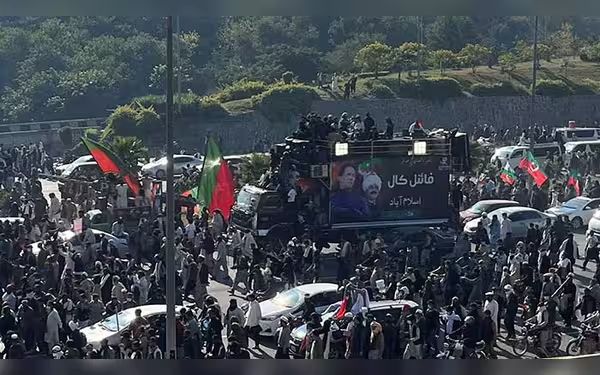Wednesday, December 4, 2024 08:15 AM
Imran Khan's Accountability Stance After Protest Failure
- Imran Khan to hold party members accountable.
- PTI faces internal strife and external pressures.
- Protest at D-Chowk leads to significant arrests.
 Image Credits: geo
Image Credits: geoImran Khan prepares to hold party members accountable following a failed protest, facing internal dissent and external challenges.
In recent days, the political landscape in Pakistan has been shaken by the aftermath of a protest organized by the Pakistan Tehreek-e-Insaf (PTI) party. This protest aimed to secure the release of its founder, Imran Khan, who has been imprisoned for over a year. However, the demonstration did not achieve its intended goal and has led to significant internal and external challenges for the party.
Mashal Yousafzai, the spokesperson for Bushra Bibi, Imran Khan's wife, stated that Khan would be the one to hold individuals accountable for the protest's failure. She mentioned, "She [Bushra] reached the D-Chowk as per Khan's directions, whereas party leadership wasn't there. Whatever happened, Khan sahib will hold [people] accountable." This statement highlights the confusion and division within the party regarding the protest's strategy and execution.
The protest, which took place at D-Chowk in Islamabad, faced a swift government crackdown, resulting in the arrest of nearly 1,000 supporters. This has raised questions about the decision to hold the protest at D-Chowk instead of the initially proposed location at Sangjani. Contradictory statements from party leaders have only added to the uncertainty, with some claiming that Khan was initially in favor of Sangjani, while others assert he rejected the idea.
As the dust settles, the PTI is grappling with significant internal strife. The party's secretary general, Salman Akram Raja, and Sahibzada Hamid Raza, the Chairman of the Sunni Ittehad Council, have resigned from their positions, further complicating the party's situation. The internal turmoil is compounded by external pressures, including a potential ban on the PTI and the looming threat of governor's rule in Khyber Pakhtunkhwa (KP).
In a recent development, the Balochistan Assembly passed a resolution calling for violent actions against the PTI, labeling it an "anarchist group." Similarly, a resolution has been submitted to the Punjab Assembly, urging strict measures against the PTI, which is being described as a "disruptive group" masquerading as a political party. These actions reflect the growing discontent among rival political factions and the increasing isolation of the PTI.
Rana Sanaullah, an adviser to the Prime Minister on Political Affairs, mentioned that the issue of imposing governor's rule in KP has been discussed within the federal cabinet, but no consensus has been reached yet. He stated, "Opinions were divided on the issue. However, the members decided to further deliberate on the matter." This indicates that the political future of the PTI remains uncertain as discussions continue.
The aftermath of the Islamabad protest has left the PTI in a precarious position, facing both internal dissent and external challenges. As Imran Khan prepares to hold individuals accountable for the protest's failure, the party must navigate a complex political landscape that threatens its very existence. The coming days will be crucial for the PTI as it seeks to regain its footing and address the concerns of its supporters while contending with the pressures from rival political entities.













